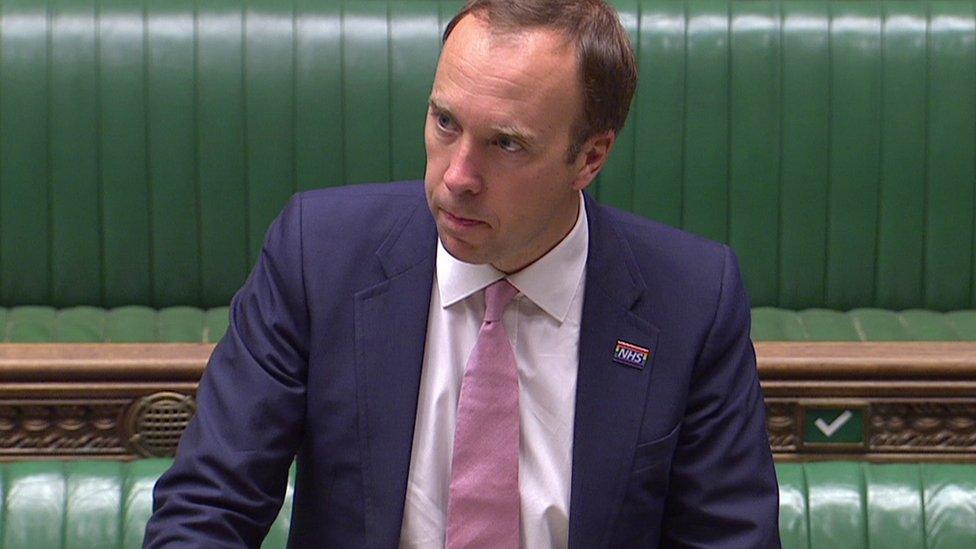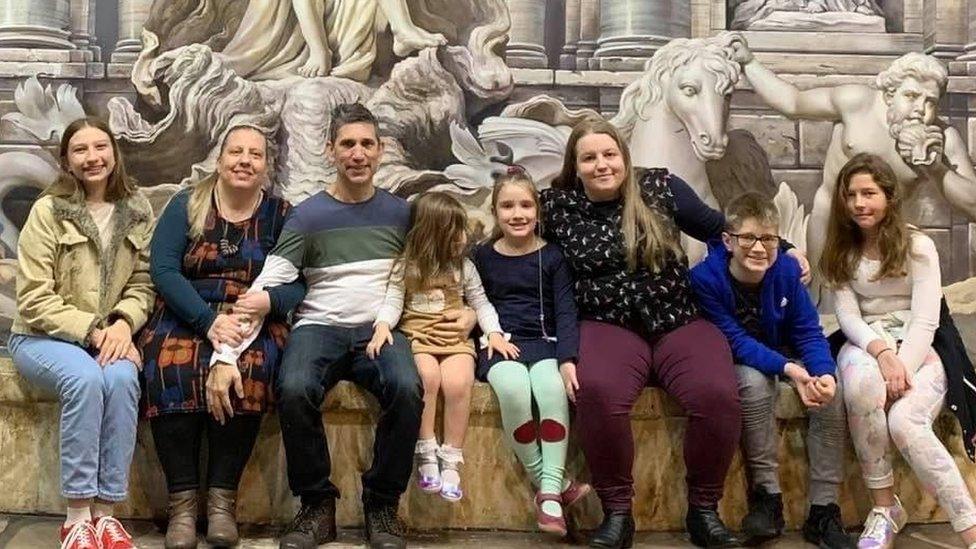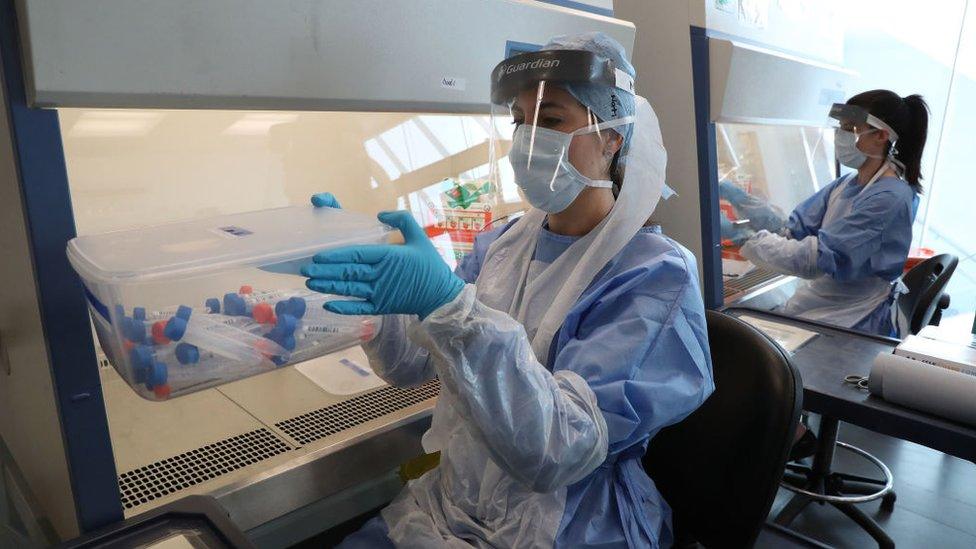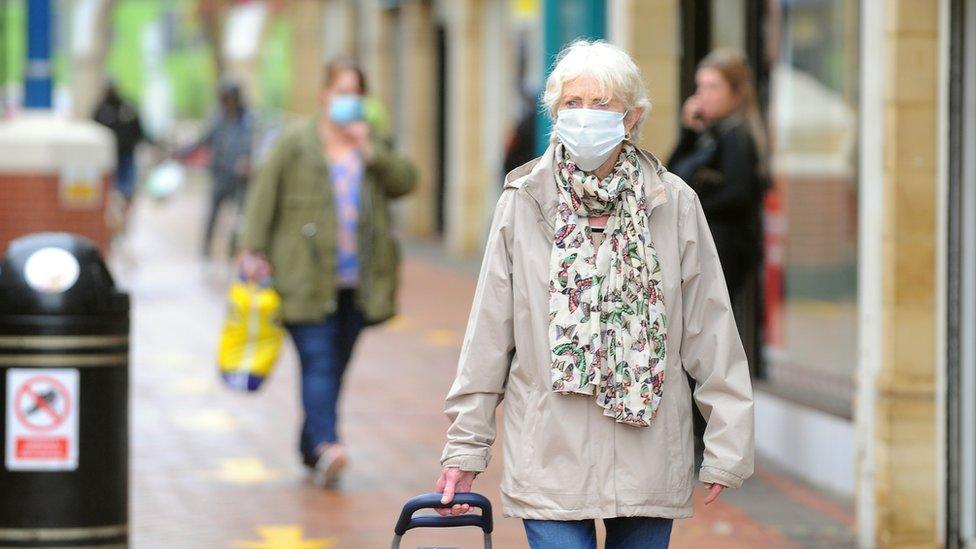Coronavirus: Testing problems to be solved in weeks, says Hancock
- Published
- comments

The testing system is facing an "enormous challenge" after a "sharp rise" in those seeking a Covid-19 test, Health Secretary Matt Hancock has said.
When asked about reports of people struggling to get tested, Mr Hancock said it would take a "matter of weeks" to resolve the issues.
He said No 10 would update its testing policy shortly to prioritise the most urgent cases.
Test slots have been limited due to bottlenecks in lab processing of swabs.
The rise in demand for tests had led to local shortages, with Labour saying no tests were available in virus "hotspots" over the weekend.
Hospital bosses have also warned that a lack of tests for NHS workers is putting services at risk.
People have told the BBC of their frustration at being turned away from a walk-in test centre in Oldham, Greater Manchester.
A woman attending the walk-in centre said staff told her that labs were struggling to turn tests around.
BBC Health editor Hugh Pym said: "There seem to be enough testing sites, but there are bottlenecks in the labs for processing the swabs taken. That's why they're limiting the amount of slots for the public, just when more people want to get tested."
One Cabinet minister told BBC political editor Laura Kuenssberg this was a "classic government problem" where demand for a public service outstrips supply.
The minister, she said, was confident that "underneath the noise", the majority of people were getting the service they needed, when they needed it.
The BBC spoke to people trying to get tests at a centre in Oldham
On Saturday, Cabinet Office minister Michael Gove told the BBC that the government was working to boost testing capacity through investment in new testing centres and so-called lighthouse labs.
Scotland's First Minister Nicola Sturgeon has said she is hopeful that a backlog in test results will be resolved shortly, after "constructive" talks with Mr Hancock.
The UK government announced 3,105 new lab-confirmed cases on Tuesday, external, bringing the total number of positive tests to 374,228. Another 27 people have died within 28 days of a positive coronavirus test, bringing the overall death toll to 41,664.
The number of patients in mechanical ventilation beds across the UK has passed 100 for the first time in nearly two months. There were 106 patients on ventilation in the UK on Monday - the first time the figure has been over 100 since 24 July.
UK-wide figures for today are yet to be published but there were 101 patients on ventilation in England alone on Tuesday.


Around 220,000 tests are processed each day, according to government figures released last week, external, with a testing capacity of more than 350,000 - which includes swab tests and antibody tests. The aim is to increase that to 500,000 a day by the end of October.
Speaking in the House of Commons, Mr Hancock said there were "operational challenges" with testing which the government was "working hard" to fix.
He said throughout the pandemic they had prioritised testing according to need.
Mr Hancock said the "top priority is and always has been acute clinical care", followed by social care, where the government is sending "over 100,000 tests a day" due to the virus risks in care homes.
Matt Hancock: "We're working around the clock to make sure everyone who needs a test can get a test"
Conservative chairman of the Health and Social Care Committee Jeremy Hunt was among the MPs to question Mr Hancock on testing, saying a number of his constituents had to travel for tests, while one key worker had to wait a week for her results.
"A week ago today, the secretary of state told the Health Select Committee that he expected to have this problem solved in two weeks," Mr Hunt said.
"Is the secretary of state, given the efforts that his department is making, still confident that in a week's time we will have this problem solved?"
"I think that we will be able to solve this problem in a matter of weeks," Mr Hancock replied.
He said demand was "high" but "record capacity" was being delivered, with plans to ensure tests are prioritised for those that need them most.


Despite the health secretary's promises, there will be no easy solution to the shortages of tests.
All the expectations are that cases will go up. People are circulating more as society reopens and we are entering the period when respiratory viruses thrive.
As cases go up so will demands on the testing system. Even with the promise of more testing capacity in the coming weeks, the chances of shortages continuing remains a distinct possibility.
A new lab is due to open later this month which will be able to carry out 50,000 tests a day. But this could easily be swallowed up.
What it means is that testing will have to be prioritised where it is needed most. That will be in care homes, hospitals and among key workers, as well as where there are local outbreaks. The government's surveillance programme run by the Office for National Statistics will also be protected.
But this is not unique to the UK. Other countries are facing similar pressures. In fact, the UK is testing more people per head of population than Spain, France and Germany.
It promises to be a difficult winter across Europe.

'Enormous challenge'
Labour's shadow health secretary Jonathan Ashworth said Mr Hancock was "losing control of this virus".
He said that after schools and offices reopened, extra demand on the system was "inevitable". He questioned why Mr Hancock did not use the summer "to significantly expand" NHS lab capacity and "fix" contact tracing.
Responding, Mr Hancock said it was "inevitable" that demand would rise with a free service, adding the "challenge" was to ensure tests are prioritised for those who most need them.

YOUR QUESTIONS: We answer your queries
THE R NUMBER: What it means and why it matters
LOCAL LOCKDOWNS: What happens if you have one?
TEST AND TRACE: How does it work?
FURLOUGH: What happens when the scheme ends?

Earlier, Home Secretary Priti Patel told BBC Breakfast the government was "surging capacity" where it was needed.
She said there is "much more work" to be done with Public Health England (PHE) and local public health bodies; and that No 10 would continue to work with PHE to "surge where there is demand" in hotspots.
Ms Patel also said England's new rule of six meant families should not stop in the street to talk to friends.

MINDFUL ESCAPES: Why is breathing so important?
DAVID ATTENBOROUGH IS BACK: An exclusive look at Extinction: The Facts

- Published15 September 2020

- Published15 September 2020

- Published15 September 2020
